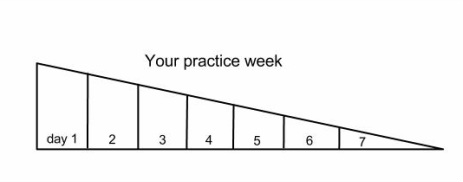Practicing
Improvement without practice is not possible. You must devote time daily to working out fingering patterns, building your muscle memory and making sense of music theory - memorizing your cycle of 5ths, 3rds, order of sharps and flats, etc.
Playing an instrument is all about muscle memory regardless of what you might think. Reading music and theory, on the other hand, are about memorization and repetitive skill building.
My analogy about muscle memory is dog training. If you want your dog to lie down, you don't tell him to sit. He'll do whatever he wants unless you insist that he lie down. Your fingers are exactly the same. They do whatever they want - which almost always is wrong - until you tell them to do exactly what you want. After the goal is clear (with your fingers and your dog), you repeat the exercise until the behavior is internalized.
Practice is a process that takes time. If you, as a novice, don't want to devote a half hour or more to practicing every day in one sitting, try practicing for 5 minutes at a time a few times a day. Amazingly, your body doesn't know the difference between the passing of a half hour or the passing of a whole day as far as the digestion of your repetitive physical training to develop your muscle memory is concerned.
Daily practice is important. It's a mistake, if you're really trying to make some progress, to think you can cram on the day of your lesson, or to do all your practicing the night before. When I was studying, preparing for college, I made a chart that I'd tape to the wall where I'd mark down whether I practiced that day or not, and for how long. It was similar to those pill boxes people use that say, "Monday, Tuesday..." etc. That practice chart helped me make sure I wasn't just deluding myself into thinking that I was being diligent.
I suggest doing the bulk of your practicing as soon as possible after your lesson so that by the time your next lesson day comes around, you're simply reviewing. Your practice week would look something like the diagram below, with more time spent or intensity at the beginning and less at the end of the week. The beginning of the week is the ingestion of information. The end of the week is review and confirmation that you've actually learned something, proving to yourself that you're ready to show your teacher what you can do. You're always better off being in the reviewing stage rather than the learning stage when you arrive at your next lesson.
Playing an instrument is all about muscle memory regardless of what you might think. Reading music and theory, on the other hand, are about memorization and repetitive skill building.
My analogy about muscle memory is dog training. If you want your dog to lie down, you don't tell him to sit. He'll do whatever he wants unless you insist that he lie down. Your fingers are exactly the same. They do whatever they want - which almost always is wrong - until you tell them to do exactly what you want. After the goal is clear (with your fingers and your dog), you repeat the exercise until the behavior is internalized.
Practice is a process that takes time. If you, as a novice, don't want to devote a half hour or more to practicing every day in one sitting, try practicing for 5 minutes at a time a few times a day. Amazingly, your body doesn't know the difference between the passing of a half hour or the passing of a whole day as far as the digestion of your repetitive physical training to develop your muscle memory is concerned.
Daily practice is important. It's a mistake, if you're really trying to make some progress, to think you can cram on the day of your lesson, or to do all your practicing the night before. When I was studying, preparing for college, I made a chart that I'd tape to the wall where I'd mark down whether I practiced that day or not, and for how long. It was similar to those pill boxes people use that say, "Monday, Tuesday..." etc. That practice chart helped me make sure I wasn't just deluding myself into thinking that I was being diligent.
I suggest doing the bulk of your practicing as soon as possible after your lesson so that by the time your next lesson day comes around, you're simply reviewing. Your practice week would look something like the diagram below, with more time spent or intensity at the beginning and less at the end of the week. The beginning of the week is the ingestion of information. The end of the week is review and confirmation that you've actually learned something, proving to yourself that you're ready to show your teacher what you can do. You're always better off being in the reviewing stage rather than the learning stage when you arrive at your next lesson.
Read this interesting article on the topic of efficient practicing by Dr. Noa Kageyama at LifeHacker.com.
